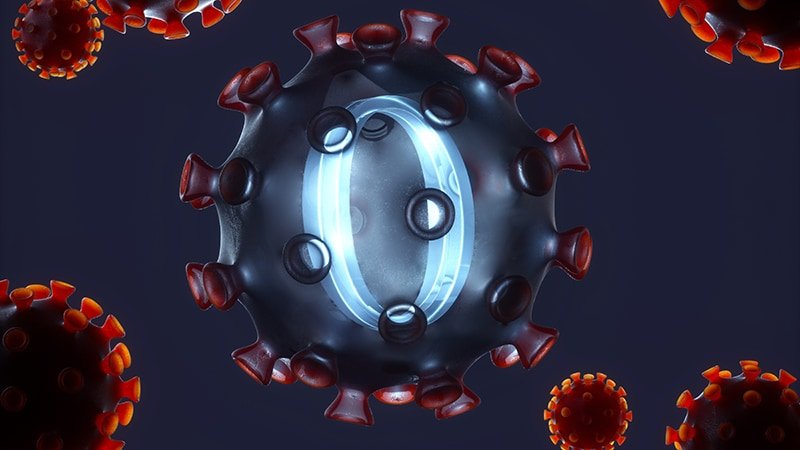Could Omicron Hasten the Transition From Pandemic to Endemic?
Editor’s note: Find the latest COVID-19 news and guidance in Medscape’s Coronavirus Resource Center.
The record-setting surge in COVID-19 cases nationwide — including more than one million new infections reported on January 3 — raises questions about whether the higher Omicron variant transmissibility will accelerate a transition from pandemic to endemic disease.
Furthermore, does the steep increase in number of people testing positive for SARS-CoV-2 mean the United States could finally achieving a meaningful level of ‘herd immunity’?
Infectious disease experts weigh in on these possibilities.
An Endemic Eventuality?
Whether the current surge will mean the predicted switch to endemic COVID-19 will come sooner, however, “is very hard to predict,” Michael Lin, MD MPH, told Medscape Medical News.
“It’s an open question,” he said, “if another highly transmissible variant will emerge.”

Dr Michael Lin
On a positive note, “at this point many more people have received their vaccinations or been infected. And over time, repeated infections have led to milder symptoms,” added Lin, hospital epidemiologist at Rush Medical College in Chicago, Illinois.
“It could end up being a seasonal variant,” he said.

Dr Eleftherios Mylonakis
COVID-19 going endemic is “a real possibility, but unfortunately…it doesn’t seem necessarily that we’re going to have the same predictable pattern we have with the flu,” said Eleftherios Mylonakis, MD, PhD, chief of infectious diseases for Lifespan and its affiliates at Rhode Island Hospital and Miriam Hospital in Providence.
“We have a number of other viruses that don’t follow the same annual pattern,” he said.
Unknowns include how long individuals’ immune responses, including T-cell defenses, will last going forward.
A transition from pandemic to endemic is “not a light switch and there are no metrics associated with what endemic means for COVID-19,” said Syra Madad, DHSc., MSc, MCP, an infectious disease epidemiologist at Harvard’s Belfer Center for Science and International Affairs, Boston, Massachusetts.
“Instead, we should continue to focus on decreasing transmission rates and preventing our hospitals from getting overwhelmed,” she said.
A Hastening to Herd Immunity?
“The short answer is yes,” Lin said when asked if the increased transmissibility and increased cases linked to the Omicron surge could get the US closer to herd immunity.
“The twist in this whole story,” he said, “is the virus mutated enough to escape first-line immune defenses, specifically antibodies. That is why we are seeing breakthrough infections, even in highly vaccinated populations.”
Mylonakis was more skeptical regarding herd immunity.
“The concept of herd immunity with a rapidly evolving virus is very difficult” to address, he said.
One reason is the number of unknown factors, Mylonakis said. He predicted a clearer picture will emerge after the Omicrons surge subsides. Also, with so many people infected by the Omicron variant, immune protection should peak.
“People will have boosted immunity. Not everybody, unfortunately, because there are people who cannot really mount [a full immune response] because of age, because of immunosuppression, etc.,” said Mylonakis, who is also professor of infectious diseases at Brown University.
“But the majority of the population will be exposed and will mount some degree of immunity.”
Madad agreed. “The omicron variant will add much more immunity into our population by both the preferred pathway — which is through vaccination — as well as through those that are unvaccinated and get infected with omicron,” she said.

Dr Syra Madad
“The pathway to gain immunity from vaccination is the safest option, and already over 1 million doses of the COVID-19 vaccine are going into arms per day — this includes first, second, and additional doses like boosters,” added Madad, who is also senior director of the System-wide Special Pathogens Program at New York City Health and Hospitals.
A Shorter, More Intense Surge?
The United Kingdom’s experience with COVID-19 has often served as a bellwether of what is likely to happen in the US. If that is the case with the Omicron surge, the peak should last about 4 weeks, Mylonakis said.
In other words, the accelerated spread of Omicron could mean this surge passes more quickly than Delta.
Furthermore, some evidence suggests neutralizing antibodies produced by Omicron infection remain effective against the Delta variant — thereby reducing the risk of Delta reinfections over time.
The ability to neutralize the Delta variant increased more than fourfold after a median 14 days, according to data from a preprint study posted December 27 on MedRxiv.
At the same time, neutralization of the Omicron variant increased 14-fold as participants mounted an antibody response. The study was conducted in vaccinated and unvaccinated people infected by Omicron in South Africa shortly after symptoms started. It has yet to be peer reviewed.
Eric Topol, MD, editor-in-chief of Medscape, described the results as “especially good news” in a tweet.
The current surge could also mean enhanced protection in the future.
“As we look at getting to the other side of this Omicron wave, we will end up with more immunity,” Madad said. “And with more immunity means we’ll be better guarded against the next emerging variant.”
Based on interviews with infectious disease experts and a preprint study posted December 27, 2021 on MedRxiv.
Damian McNamara is a staff journalist based in Miami. He covers a wide range of medical specialties, including infectious diseases, gastroenterology, and critical care. Follow Damian on Twitter: @MedReporter.
For more news, follow Medscape on Facebook, Twitter, Instagram, YouTube, and LinkedIn
Source: Read Full Article
